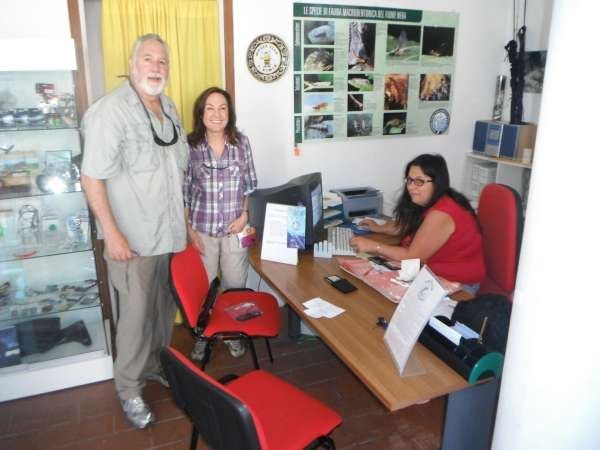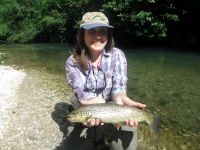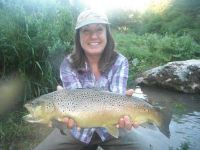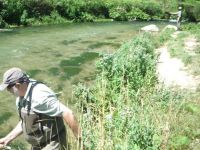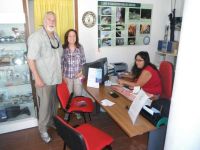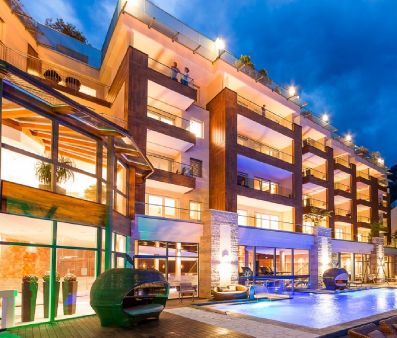My husband and I are fly-fishing partners and owners of an antique fishing tackle business called Angling Artifacts. We reside in and operate our business in Los Angeles so we find it a challenge to locate beautiful, unique and productive fly-fishing spots nearby where we live. For that reason, the majority of our fly-fishing trips have been in the Northwest part of the United States, however, we feel fortunate to have fished beautiful waters in the Adirondacks of New York, the Rocky Mountains of Colorado, the Smoky Mountains of Tennessee, Alaska, British Columbia and the historic chalk streams of southwest England, but there was something magical about fly-fishing in the Umbria region of Italy. The Umbria region is often referred to as the “green heart of Italy”. Umbria is noted for View more...My husband and I are fly-fishing partners and owners of an antique fishing tackle business called Angling Artifacts. We reside in and operate our business in Los Angeles so we find it a challenge to locate beautiful, unique and productive fly-fishing spots nearby where we live. For that reason, the majority of our fly-fishing trips have been in the Northwest part of the United States, however, we feel fortunate to have fished beautiful waters in the Adirondacks of New York, the Rocky Mountains of Colorado, the Smoky Mountains of Tennessee, Alaska, British Columbia and the historic chalk streams of southwest England, but there was something magical about fly-fishing in the Umbria region of Italy. The Umbria region is often referred to as the “green heart of Italy”. Umbria is noted for it’s enormous cypress, pine and chestnut forests. The picturesque countryside with its’ rolling green hills, carpeted fields of bright yellow sunflowers, valleys filled with streams dotted with medieval and renaissance architectural structures was spectacular. To know that Roman solders once traveled throughout this region or that perhaps Da Vinci, Michelangelo or any of the other great artists of the renaissance period may have looked to this region as inspiration was awe inspiring. And then to fly fish these waters, was truly a magical experience.
In the summer of 2014, my husband and I decided to take a 3-week vacation touring Italy. Always looking for a new area to fish we took this opportunity to explore the possibility of fly-fishing while over there. We asked ourselves, “Is there fly-fishing in Italy?” It is not discussed much within the fly fishing community because as we now have come to believe, it is one of those little known secrets. But how does one go about arranging such a trip? What would be the logistics? What about the language barrier? Thankfully, the Internet is such a useful tool and allowed me to research those companies and/or guides that I believed would make our time on the river not only enjoyable but productive as well.
After reviewing several guide services, we selected Luca Castellani, http://www.lucacastellani.it.
Born and raised in Perugia, Umbria, and having fished the area for more than 35 years, his knowledge of the Umbria/Tuscany region is unsurpassed. This along with his command of the English language proved Luca to be the perfect Italian fly fishing guide. A fly casting instructor (we could always use some tips on how to improve our casting techniques), Fly Fishermen of the Year in 2007, a fly tyer (understands entomology) and a champion of the local environment (instrumental in designating catch and release programs in local streams), we made our decision. I sent him an email and we talked on the phone. Luca provided us with all the necessary equipment (waders, boots, rods, reels and of course, flies that he tied himself) which made traveling to Italy easy and all the more enjoyable.
Luca recommended that we fish the Nera River. The Nera River is approximately 70 miles long and flows through the Umbria countryside and is the tributary to the Tiber River that flows through Rome. As we were to be fishing in July, a warm time of the year, Luca suggested that we fly fish the Upper Nera River.
The Upper Nera River is a natural spring creek, which provides cool, clear water, an ideal habitat for trout to live, perfect for that time of year. Restricted to classic fly fishing with catch and release regulations, this helps to sustain the trout population which also helps to increase ones odds of catching a big brown trout.
Fishing in the morning was quite productive as my husband and I both caught several nice browns.
After several hours, we took a luand within a few hundred yards of the river is located an Italian inspired home that had been converted into an inn and restaurant. Without having to remove our waders, on a wonderful shaded patio with a soft blowing breeze, we were served traditional Italian food, as good as any 4 star restaurant. And of course, wine, what would Italy be without their wine! After a 2-hour lunch break (Italians know how to truly enjoy their food and love to converse about their country and the local traditions) we go back out for several more hours of fishing.
Luca is enthusiastic, yet relaxed and is very patient. He is eager to give tips on how to cast into those tight areas where the “big” brown trout lie. He loves to fish, loves to be outdoors and does not work on a time clock so he tells us we can fish as long as we want because he is there for us. We had a very long day of fishing and did, indeed, catch a big trout! Our only regret was that we could not have stayed several more days to enjoy fishing this beautiful region.
Fly-fishing in the Umbria/Tuscany region of Italy is a special, magical trip and should not be overlooked as a unique spot to go fly-fishing. We hope to travel there again and would enjoy seeing more of this beautiful country and of course, do some fly-fishing!
How we got there:
We flew from Los Angeles to Rome and then took a train from Rome to Spoleto (approximately 2 hours). We stayed at a hotel in Spoleto and Luca picked us up at our hotel to take us fly-fishing.


